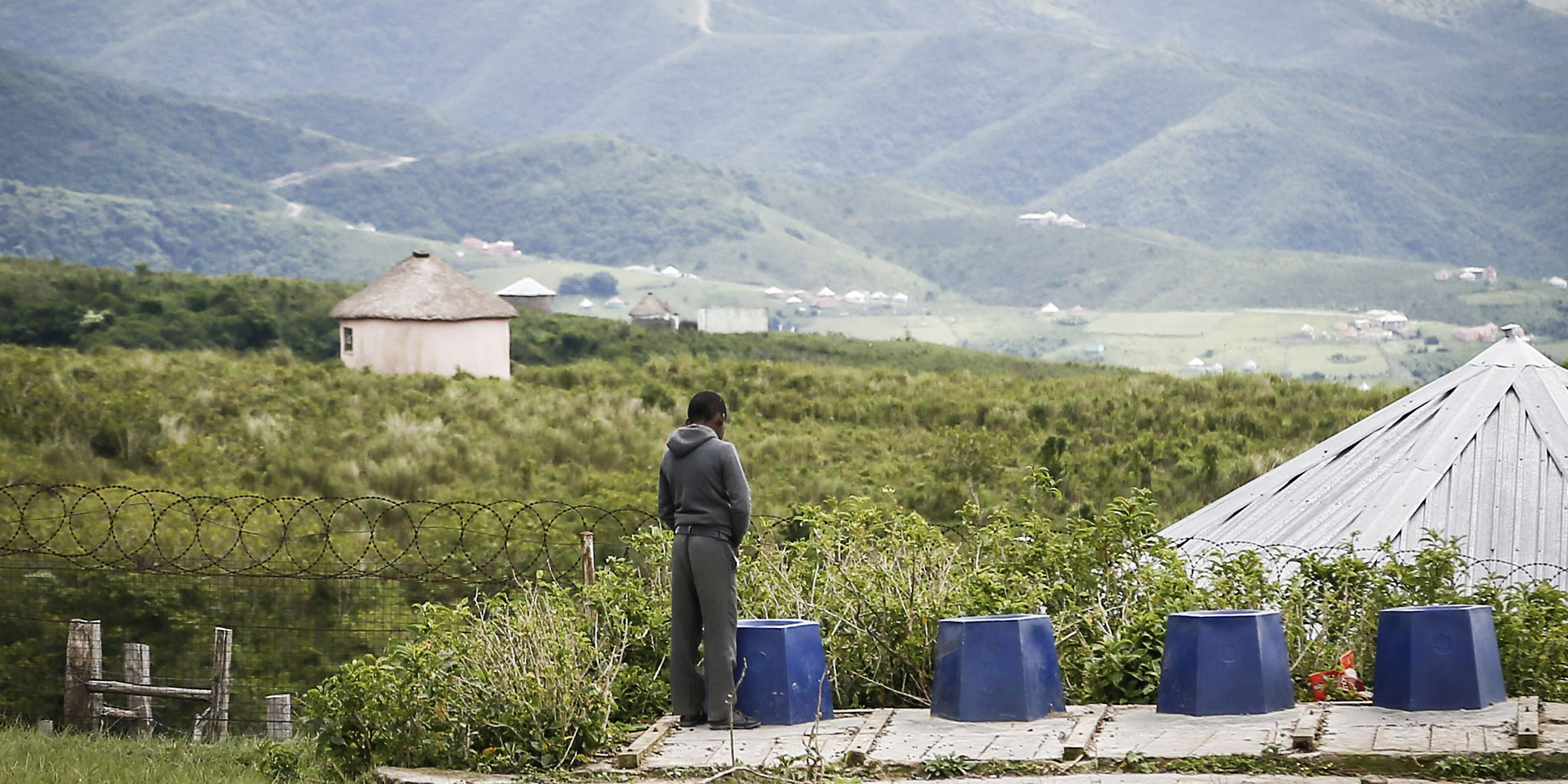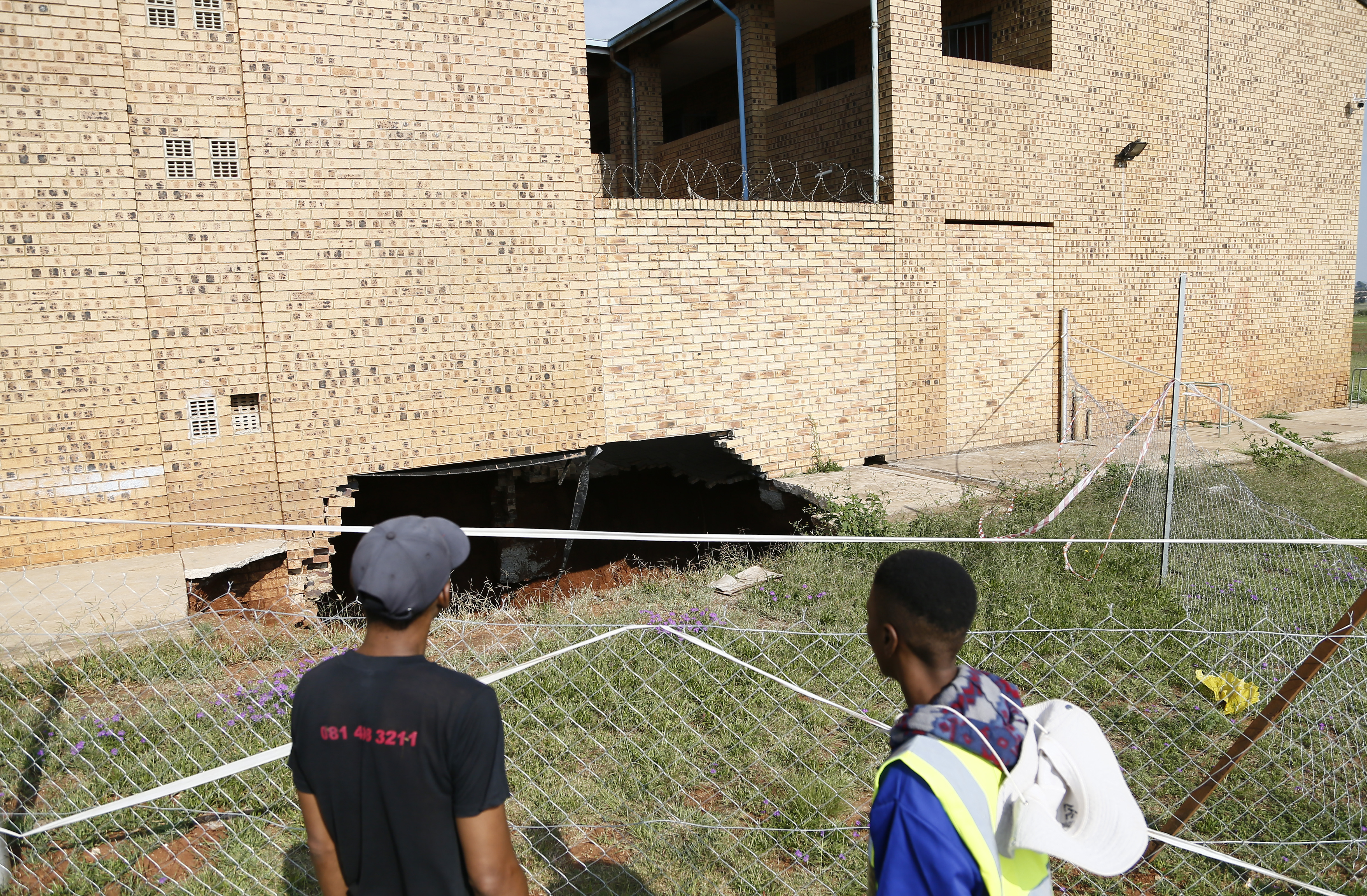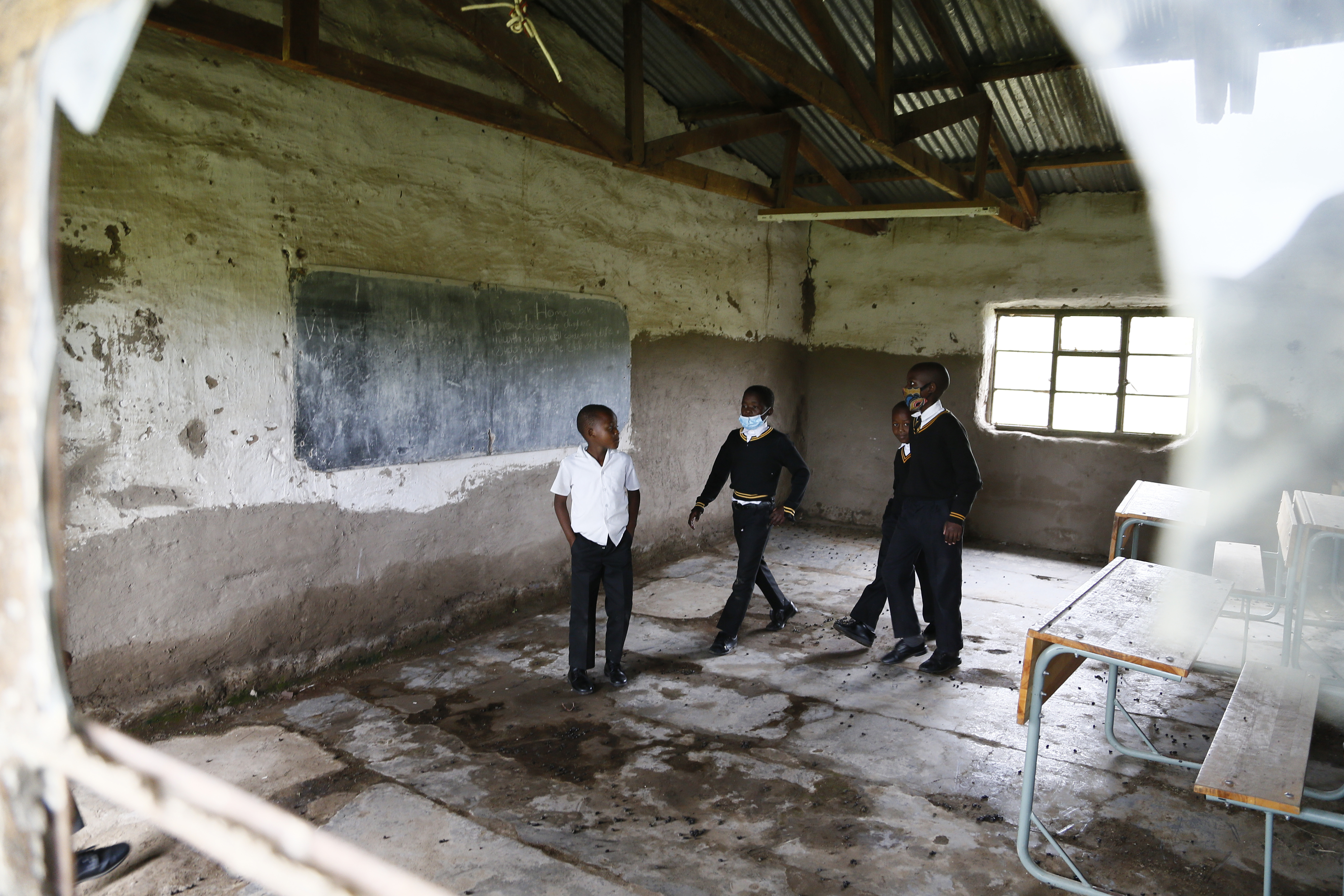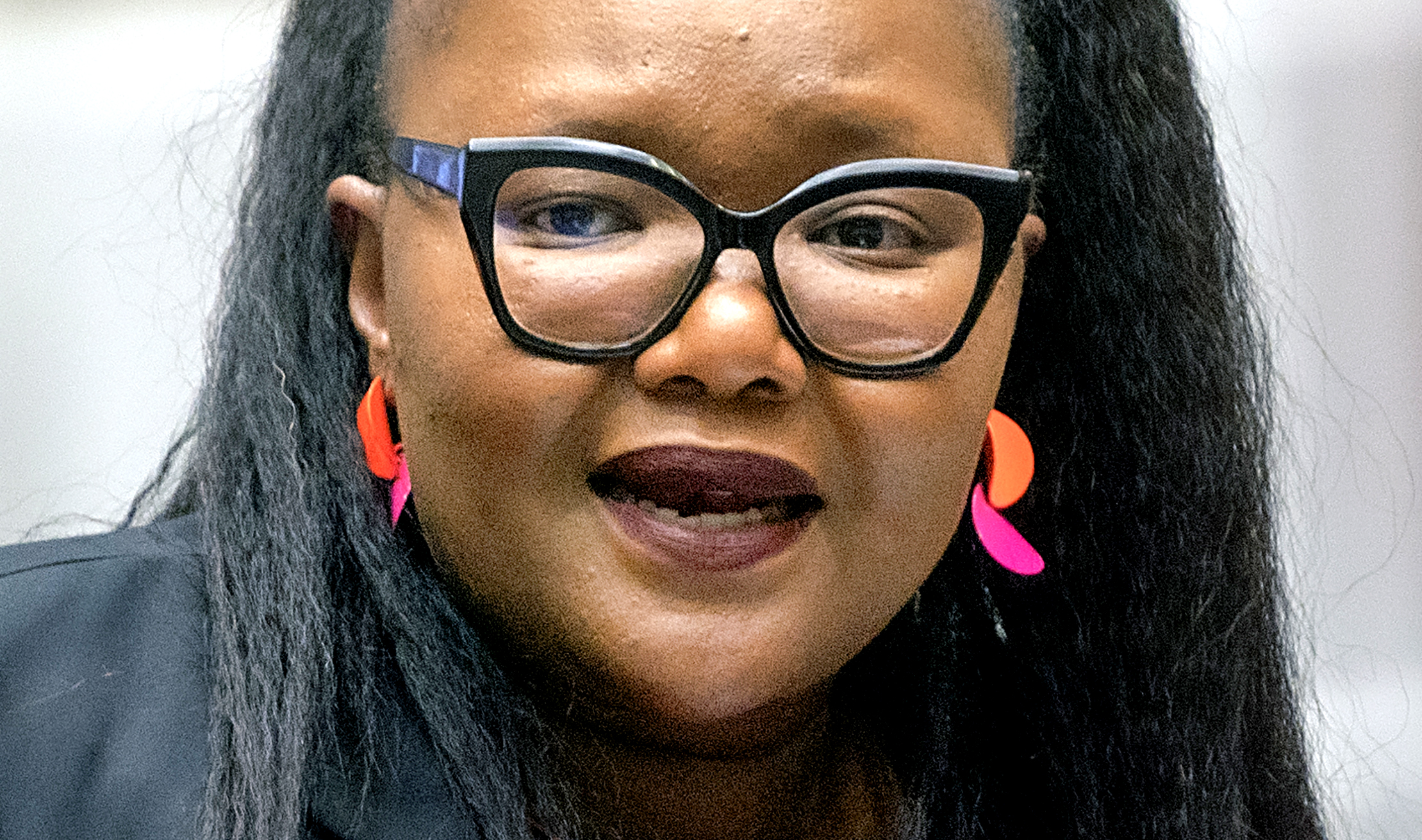‘If we’re going to say we’re pushing education outcomes, we have got to create an environment that is conducive for those outcomes to happen. It is in that vein that the Sanitation Appropriate for Education (Safe) initiative was started back in 2018.”
These were the words of Basic Education Minister Siviwe Gwarube during a parliamentary committee meeting on Tuesday, 19 November. The meeting provided a progress update on school infrastructure, issues related to water and sanitation and addressed ongoing efforts to eradicate pit latrines in schools.
Gwarube noted that the meeting coincided with World Toilet Day, an observance to promote the global commitment to providing safe and dignified sanitation for all and that the Safe initiative highlighted the government’s commitment to addressing inadequate and unsafe sanitation infrastructure in South Africa’s schools.
 A pupil at Vulingcobo Junior Secondary School uses an old pit latrine at the Sibanye-Stillwater mine in Xhora, near Elliotdale in the Eastern Cape. (Photo: Felix Dlangamandla / Daily Maverick)
A pupil at Vulingcobo Junior Secondary School uses an old pit latrine at the Sibanye-Stillwater mine in Xhora, near Elliotdale in the Eastern Cape. (Photo: Felix Dlangamandla / Daily Maverick)
The purpose of Safe is to provide sufficient sanitation facilities to schools in South Africa. To date, the initiative has completed 3,145 out of 3,375 targeted sanitation projects, with significant contributions from corporate and social partners.
“This is obviously due to the work that’s done by provincial education departments, the work that’s being done by the Department of Basic Education (DBE), but also some of the work done by corporate and social partners who are helping us clear this backlog,” she said.
Read more: Here’s my promise — by 31 March 2025 all pit toilets in SA schools will be eradicated
On Monday, 18 November, Gwarube and Public Works Minister Dean Macpherson were in Ozwathini in KwaZulu-Natal to unveil upgraded ablution facilities at Deda Primary School, which has about 600 learners. The project was made possible through a public-private partnership, with Gwarube thanking Breadline Africa, Glencore, the Development Bank of Southern Africa and Easy Equities for assisting in the restoration of the toilets.
Nearly 11,000 schools in the country lack a single flushing toilet, and 3,398 schools still rely on pit latrines. Additionally, at least 25% of schools do not have access to running water.
The Department of Basic Education has set a deadline that by 31 March 2025, all remaining pit toilets in schools across the country should be eradicated.
Equal Education researcher Kimberley Khumalo said that it could only be hoped that the self-imposed deadlines would not be shifted again.
“The DBE must understand that every extension it gives itself means that learners continue to have limited access to education in unsafe and unconducive learning environments,” she said.
Impact of budget policy changes
Gwarube also addressed recent changes in the Medium-Term Budget Policy Statement. Finance Minister Enoch Godongwana announced that the Education Infrastructure Grant and the School Infrastructure Backlog Grant would be merged, meaning the funds for infrastructure and backlog issues would be handled at the provincial level, rather than being managed directly by the Department of Basic Education.
This is part of a broader effort to streamline government spending and make funds go further. The merging of these funds presents new challenges for the Department of Basic Education, which will now have a more prominent oversight role.
 Break time at Balasi primary school in Qumbu outside Mthatha on the first day of the opening of coastal schools on 19 January 2022. (Photo: Felix Dlangamandla / Daily Maverick)
Break time at Balasi primary school in Qumbu outside Mthatha on the first day of the opening of coastal schools on 19 January 2022. (Photo: Felix Dlangamandla / Daily Maverick)
“Within DBE we have to reimagine how we deal and deliver infrastructure; we’re going to have a far more robust oversight role, we’re going to have to do a lot of grant management work with provinces, we’re going to have to do a lot of capacity building for provinces to deal with these infrastructure backlogs on their own,” said Gwarube.
Khumalo said Equal Education strongly believed that the proposed merger of the School Infrastructure Backlog Grant with the Education Infrastructure Grant demanded rigorous scrutiny, as the fundamental reason for the School Infrastructure Backlog Grant’s introduction remained unresolved.
Read more: New MPs in drive to fast-track overdue eradication of dangerous school toilets
“Transferring direct administrative responsibility to [provincial education departments] – which are notoriously under-capacitated and produce snail-paced progress – requires an evidence-based approach that demonstrates their capacity to effectively eradicate these longstanding infrastructure challenges,” said Khumalo.
Before proceeding with the merger, the Department of Basic Education must provide evidence of provincial readiness, including detailed implementation plans, performance metrics and clear accountability mechanisms, to ensure more effective infrastructure development than the current approach, where the national Department of Basic Education is accountable for addressing school infrastructure backlogs, said Khumalo.
Asidi Programme: Achievements and ongoing challenges
In 2011, the Department of Basic Education launched the Accelerated Schools Infrastructure Delivery Initiative (Asidi) to address critical infrastructure gaps in schools. The programme focused on replacing schools built with inadequate materials such as mud, providing reliable water and sanitation, and ensuring electricity for schools lacking these basic services. Asidi aimed to improve the learning environment and deliver essential services to schools in need.
 Relebogile Secondary School in Khutsong, Carletonville, evacuated because of the dangers posed by the sinkholes. (Photo: Felix Dlangamandla)
Relebogile Secondary School in Khutsong, Carletonville, evacuated because of the dangers posed by the sinkholes. (Photo: Felix Dlangamandla)
Department of Basic Education Director-General Hubert Mathanzima Mweli said all 331 Asidi schools built entirely of inappropriate materials had been replaced.
“We have built state-of-the-art schools, particularly in areas like the Eastern Cape, KwaZulu-Natal and Limpopo. However, the challenge we face is that many of these regions, despite having advanced facilities, have experienced depopulation as people migrate from areas with little economic activity to regions with more opportunities. As a result, many of these new schools are operating at only half their intended capacity,” said Mweli.
Read more: Six-year-old the latest pupil rescued from pit toilet at Eastern Cape school
The School Register of Needs survey of 2006 recorded 3,265 schools with no toilets, and in 2011, 701 schools were initially included in the Asidi programme. This increased to 1,087, and all 1087 Asidi sanitation projects provided ventilated, improved pit latrines (VIP).
“I must indicate these are not water-borne toilets; VIP toilets are safe and approved by the United Nations to be used all over the world and can even preserve hygienic conditions,” he said.
The School Register of Needs survey found 8,823 schools without water. In 2011, 1,117 schools were included in the Asidi initiative, a number that grew to 1,336. According to Mweli, all 1,336 water supply projects had now been completed.
Many schools rely on rain-harvested water, even where boreholes and bulk water supply are available. In rural areas without bulk supply, rainwater is shared with local communities. Though unsafe for consumption, it was the only option available, he said.
Mweli said that around 10 implementing agents, including Public Works and provincial entities, faced significant capacity challenges. Many were overwhelmed by handling projects across multiple sectors and relied on overstretched contractors. To address this, the department was exploring a framework agreement to allocate projects to more capable agencies.
Slow progress, lingering issues and overdue promises
Students in thousands of schools across South Africa continue to use pit toilets. In January 2024, the MEC for education in the Eastern Cape disclosed that 427 schools, serving 113,041 students, were still using pit latrines. A progress report from the Limpopo Department of Education in November 2023 revealed that 1,837 schools in the province still relied on pit toilets.
In April 2024, Equal Education called on the Limpopo Education Department to adhere to its deadlines for replacing pit latrines, highlighting that the department had “already missed several legally binding deadlines”.
The nonprofit SECTION27 has criticised the Department of Basic Education for its slow progress and repeated failure to meet deadlines for eliminating pit latrines in public schools. In July 2024, SECTION27 expressed concern about the continued infrastructure challenges facing public schools, especially in KwaZulu-Natal, Limpopo and the Eastern Cape.
 Inside Balasi primary school in Qumbu outside Mthatha on the first day of the opening of coastal schools on 19 January 2022. (Photo: Felix Dlangamandla / Daily Maverick)
Inside Balasi primary school in Qumbu outside Mthatha on the first day of the opening of coastal schools on 19 January 2022. (Photo: Felix Dlangamandla / Daily Maverick)
Equal Education acknowledged the progress made, as outlined in the parliamentary committee meeting, but emphasised that it had been painfully slow and fraught with challenges, including unreliable data and a lack of accountability.
For more than a decade, Equal Education has advocated for safe, adequate infrastructure in schools, contributing to the 2013 Norms and Standards for School Infrastructure. This law set deadlines for essential infrastructure, including water, sanitation and classrooms, and banned plain pit toilets in schools.
“The DBE and [provincial education departments] missed several of these deadlines and displayed a lack of urgency in eradicating infrastructure backlogs. Disappointingly, the school infrastructure law was reviewed earlier this year and all deadlines have been removed; however, the law still bans plain pit toilets in schools,” said Khumalo.
The Asidi programme aimed to meet targets such as replacing inappropriate school toilets within three years.
“It is disappointing that it has taken more than 13 years to eradicate the infrastructure backlogs identified in 2011. Similarly, the Sanitation Appropriate for Education programme, established in 2018, has made slow progress with 230 schools still waiting for relief,” Khumalo said.
Dr Ferrial Adam, executive manager of WaterCAN, an Organisation Undoing Tax Abuse initiative, describes the widespread use of pit latrines, failing wastewater treatment systems and the safety risks faced by children in schools still reliant on pit latrines as a national crisis that requires urgent action.
“The tragic instances of children falling into pit latrines and losing their lives expose the urgent need to replace these outdated sanitation systems. This is unacceptable and an attack on people’s basic dignity,” said Adam.
WaterCAN welcomed Gwarube’s plan to eradicate pit toilets at schools by 2025 and is looking forward to her impending announcement on a monitoring tool that will be updated with live data to indicate which schools still have pit toilets.
“We urge the government to uphold its promises and prioritise sanitation infrastructure, especially in schools. According to the UN, the effects of poor sanitation reach far beyond health issues; they perpetuate poverty, inequality and environmental degradation,” said Adam. DM




 Inside Balasi primary school in Qumbu outside Mthatha on the first day of the opening of coastal schools on 19 January 2022. (Photo: Felix Dlangamandla / Daily Maverick)
Inside Balasi primary school in Qumbu outside Mthatha on the first day of the opening of coastal schools on 19 January 2022. (Photo: Felix Dlangamandla / Daily Maverick)